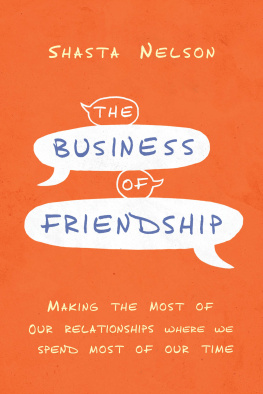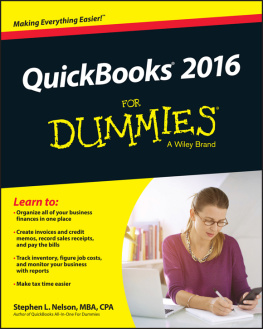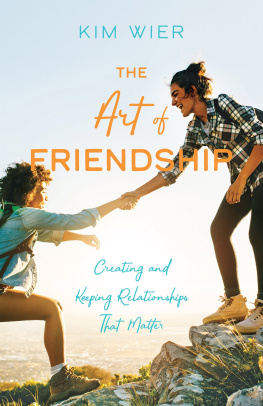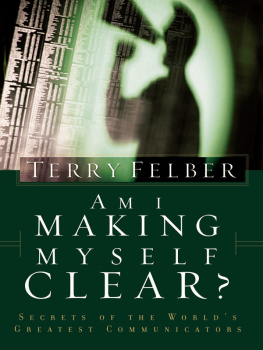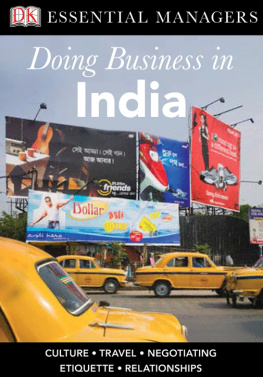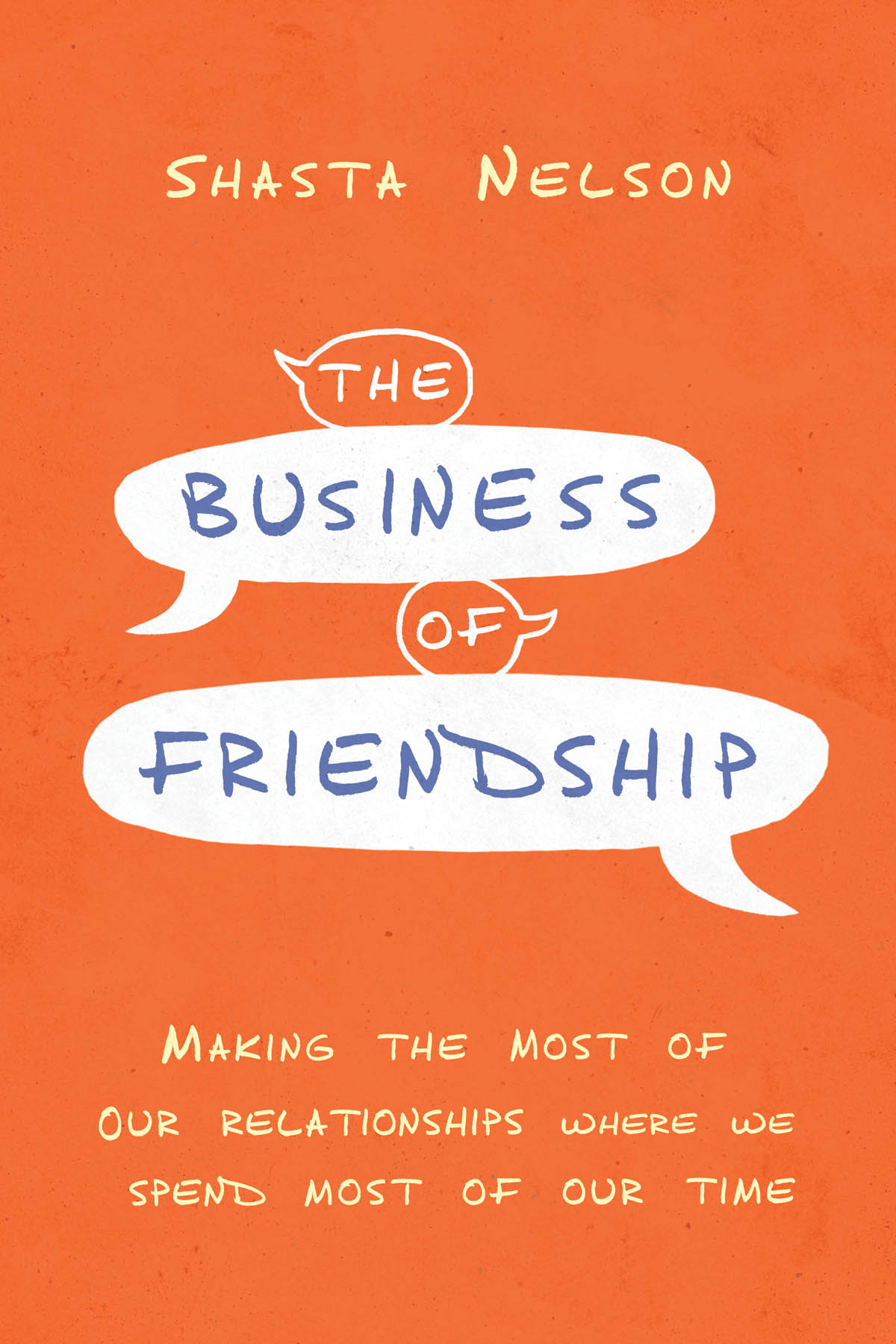2020 Shasta Nelson
All rights reserved. No portion of this book may be reproduced, stored in a retrieval system, or transmitted in any form or by any meanselectronic, mechanical, photocopy, recording, scanning, or otherexcept for brief quotations in critical reviews or articles, without the prior written permission of the publisher.
Published by HarperCollins Leadership, an imprint of HarperCollins Focus LLC.
Book design by Aubrey Khan, Neuwirth & Associates.
ISBN 978-1-4002-1697-0 (eBook)
ISBN 978-1-4002-1696-3 (HC)
Epub Edition June 2020 9781400216970
Library of Congress Control Number: 2020938776
Printed in the United States of America
20 21 22 23 LSC 10 9 8 7 6 5 4 3 2 1
Information about External Hyperlinks in this ebook
Please note that the endnotes in this ebook may contain hyperlinks to external websites as part of bibliographic citations. These hyperlinks have not been activated by the publisher, who cannot verify the accuracy of these links beyond the date of publication
To Greg, my husband, and also my favorite coworker.
Office holiday parties with you are the best!
And for Naomi, Myles, Edda, Asa, Dante, Lily, and Lucy
the little people in my heart: it is my hope that when you one
day contribute to our workforce, no matter what you do,
you thoroughly enjoy those who do it with you.
Contents
- PART 1:
Why Relationships Matter at Work - PART 2:
What Makes All Relationships Actually Work? - PART 3:
How to Make Relationships Work Better for Us
Guide
This book stands on the shoulders of some amazing researchers who have long been studying relationships, business, culture, and health in their respective fields. I do my best to footnote every study I quote in the back of this book and am in deep gratitude for their curiosity in asking big questions, their bravery for pursuing the answers, and their wisdom in their reporting. (The biggest of thanks for Kiran Adcock for compiling all those citations!)
While my expertise runs deep in friendship research and application, having written two other books on the subject, my foray into the world of business will forever be indebted to the visionary leaders who started inviting me to speak to their organizations, facilitate their team off-site meetings, and consult their managers. As promised, your names and organizations do not show up in this book, but your wisdom is loud and clear, and your stories and examples are everywhere. And even more of you took your teams through my Healthy Team Relationship Assessment, which not only gave you an accessible report on the health of the relationships within your team, but that collective data continues to reveal so much about the trends, tendencies, and needs we all face in our organizational culture.
Additionally, I facilitated my own Friendships in the Workplace Survey via social media, in which 550 respondents answered almost thirty questions about their opinions and experiences of relationships at work. These responses were invaluable, not only for the snapshot they provide of what many of us are feeling (which Ill be showing in graphs throughout this book), but the results ended up reshaping part of my book outline when I saw the incredible prevalence of some questions and fears. Additionally, their open-ended comments and stories are woven throughout this book (with fictitious names) as they give significance to what is otherwise just a statistic. If you were one who took the time to fill out that survey, thank you; my trusty calculator and I poured over your answers every which way, with wholehearted earnestness, like a kid on Christmas morning.
Speaking of stories, I am grateful to a private Facebook group of volunteers, who generously shared illustrations, triggered ideas, and acted as a focus group for me throughout my writing process. Huge thanks, also, to those of you who agreed to phone interviews with me so I could add details to your stories, updates to the data, and tips for those in similar situations. In most cases I changed your names, and in some I changed some details, but youll undoubtedly recognize your contribution.
And in informal, but never less important, ways, I share stories throughout this book that have long stayed with me from conversations with friends, coaching clients, and off-site meetings with employees.
All that to say, that while writing a book is often solitary work, the finished product was very much a community effort. (Not that any of us who value relationships are the least bit surprised!)
Im not here to make friends.
Words spoken at workplaces around the world.
For some, this oft-repeated line is used like a war cry to justify our competitive behavior, to shrug off what others think of us, or to convince ourselves why the end justifies the means. For others, we simply whisper it as our affirmation for why were heading home instead of joining our coworkers for a round of drinks; we assure ourselves that its best to keep a clear line between our professional and personal lives.
So many of usemployees and managers alikestill have serious doubts when it comes to making friends at work. When I wrote my other two booksone on making new friends as an adult and the other on how to deepen our friendshipsno one challenged me as to whether those were appropriate topics. But upon moving those very-needed friendships to our workplaces where we spend most of our time? Almost 30 percent of us arent so sure.
It is appropriate to have a best friend at work. |
Definitely True | Probably True | I Dont Know | Probably False | Definitely False |
36% | 35% | 15% | 11% | 3% |
Now, obviously, the good news is that the remaining 70 percent of us are more or less on board with the idea of close friendships at work. And, in fact, if we have a best friend at work now, were closer to 90 percent convinced its a good thing.
With best friend: It is appropriate to have a best friend at work. |
Definitely True | Probably True | I Dont Know | Probably False | Definitely False |
64% | 26% | 5% | 3% | 2% |
No best friend: It is appropriate to have a best friend at work. |
Definitely True | Probably True | I Dont Know | Probably False | Definitely False |
20% | 36% | 22% | 16% | 6% |
Put a different way, we are three times more likely to think its appropriate to have a best friend if we are experiencing the benefits of one, and conversely, were three times more likely to say its definitely inappropriate if we dont have one.
Unfortunately, too many of us dont have one. One of the largest workplace studies to date shows 42 percent of us dont have one. By my survey, the number was even higher with 53 percent of us not thinking we do.
Currently, I have at least one best friend at work. |
Definitely True | Probably True |

